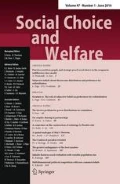Abstract.
We study a model with local public goods in which agents' crowding effects are formally distinguished from their taste types. It has been shown that the core of such an economy can be decentralized with anonymous admission prices (which are closely related to cost share prices). Unfortunately, such a price system allows for an arbitrary relationship between the public goods level in a given jurisdiction and the cost to an agent for joining. Formally, this means that admission prices are infinite dimensional. Attempts to decentralize the core with finite price systems such as Lindahl prices suggest that this is possible only under fairly restrictive conditions. In this paper, we introduce a new type of price system called finite cost shares. This system has strictly larger dimension than Lindahl prices but, in contrast to general cost share prices, is finite. We show that this allows for decentralization of the core under more general conditions than are possible with Lindahl prices.
Similar content being viewed by others
Author information
Authors and Affiliations
Additional information
Received: 18 January 2000/Accepted: 21 January 2002
The authors would like to thank two anonymous referees for their helpful comments.
Rights and permissions
About this article
Cite this article
Conley, J., Smith, S. Finite decentralization in a Tiebout economy with crowding types. Soc Choice Welfare 20, 49–75 (2003). https://doi.org/10.1007/s003550200168
Issue Date:
DOI: https://doi.org/10.1007/s003550200168




